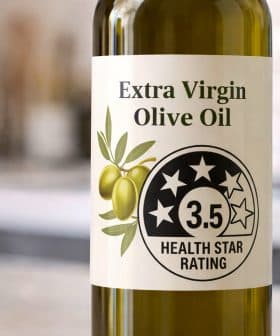Mediterranean Diet With Additional Olive Oil May Promote Heart Health Even More
Spanish scientists found the consumption of a MedDiet enhanced with four tablespoons of olive oil per day improved the beneficial actions of HDL cholesterol.
A new study found that the Mediterranean diet, especially when augmented with extra virgin olive oil, improved the functional ability of high-density lipoproteins (HDL), or “good” cholesterol, which is crucial for heart health. The study showed that consuming antioxidant-rich foods like olive oil can enhance the removal of cholesterol from arteries, protect against plaque development, and keep blood vessels open, highlighting the importance of differentiating between healthy and unhealthy fats.
Researchers know that the functional ability along with the quantity of high-density lipoproteins (HDL) or “good” cholesterol is needed for promoting heart health. A new study finds the Mediterranean diet (MedDiet) increased HDL function, and the improvements were larger if the eating plan was augmented with an extra amount of virgin olive oil.
This study helps to seal in the idea that all fats should not be considered equal.
High levels of low-density lipoproteins (LDL) or “bad” cholesterol are linked to an increased risk of cardiovascular disease, while high levels of HDL are linked to a decreased risk. LDL promotes the buildup of plaque in the arteries, but HDL absorbs cholesterol and transports it to the liver, where it is removed from the body. Therefore, HDL provides the important benefit of helping to keep the blood vessels open.
“However, studies have shown that HDL doesn’t work as well in people at high risk for heart attacks, strokes, and other cardiovascular diseases, and that the functional ability of HDL matters as much as its quantity,” said senior study author Montserrat Fitó, coordinator of the Cardiovascular Risk and Nutrition Research Group at the Hospital del Mar Medical Research Institute in Barcelona and at the Ciber of Physiopathology of Obesity and Nutrition (CIBEROBN), Spain. “At the same time, small-scale trials have shown that consuming antioxidant-rich foods like virgin olive oil, tomatoes and berries improved HDL function in humans. We wanted to test those findings in a larger, controlled study.”
Since the functional properties of HDL are so valuable, researchers purposed to determine what type of diet would enhance them. With this intent, they randomly chose 296 people at high risk of cardiovascular disease who were participating in the PREDIMED (PREvención con DIeta MEDiterránea) study.
The individuals, whose age averaged 66, were assigned to one of the following three diets for a year:
- A traditional MedDiet augmented with 4 tablespoons of virgin olive oil per day
- A traditional MedDiet augmented with a handful of nuts per day
- A healthy control diet that decreased intake of red meat, sweets, processed food and high-fat dairy products
Both MedDiets emphasized the consumption of fruits, vegetables, legumes and whole grains, as well as included moderate amounts of fish and poultry. Blood tests to measure HDL and LDL were conducted at the beginning and end of the study.
Analysis of the findings showed only the control diet lowered total and LDL cholesterol. Although none of the diets boosted the levels of HDL significantly, both MedDiets improved its functionality. Moreover, the magnitude of this benefit was much larger among those who were on the MedDiet with the extra amount of virgin olive oil.
The MedDiet enriched with olive oil resulted in the functional HDL improvements below:
- Enhancement of the process by which HDL removes cholesterol from plaque in the arteries and sends it to the liver
- Increased protection against LDL’s harmful action of stimulating plaque development
- Boosted relaxation of blood vessels, which kept them more open for the flow of blood
Because the extra quantity of olive oil was associated with the benefits in the study, it underscored the stark contrast between healthy and non-healthy fat. “This study helps to seal in the idea that all fats should not be considered equal,” Weston Childs, doctor of osteopathic medicine in Gilbert, Arizona, told Olive Oil Times. “We know from studies that most cooking oils on the market cause inflammation and lipid dysregulation by virtue of their effects on the omega 3:6 fatty acid ratio. The finding that a cold pressed oil, such as virgin olive oil, improved HDL functions shows the body metabolizes these fats very differently.”
As the control diet was rich in fruits and vegetables, like the MedDiets, the researchers were surprised it reduced the anti-inflammatory properties of HDL. A decline in this function is linked to cardiovascular disease. Participants on both MedDiets didn’t have a reduction in this area, the authors wrote.
“Following a Mediterranean diet rich in virgin olive oil could protect our cardiovascular health in several ways, including making our ‘good cholesterol’ work in a more complete way,” concluded Fito. The study was published in the American Heart Association’s journal Circulation.









